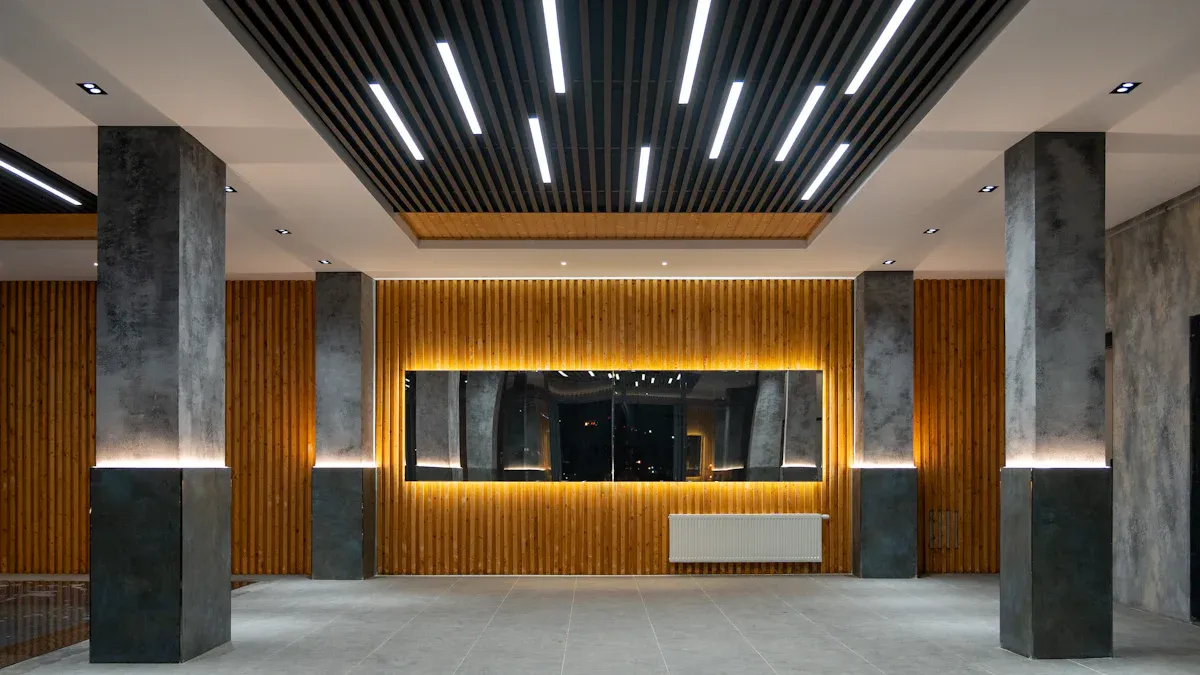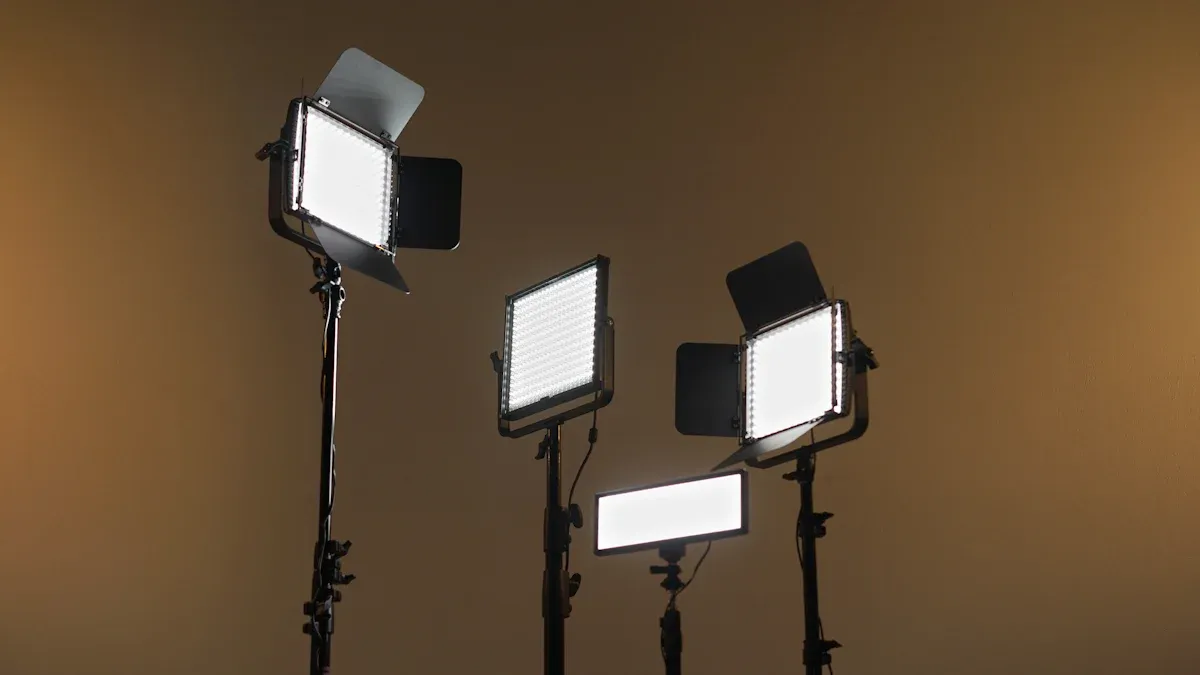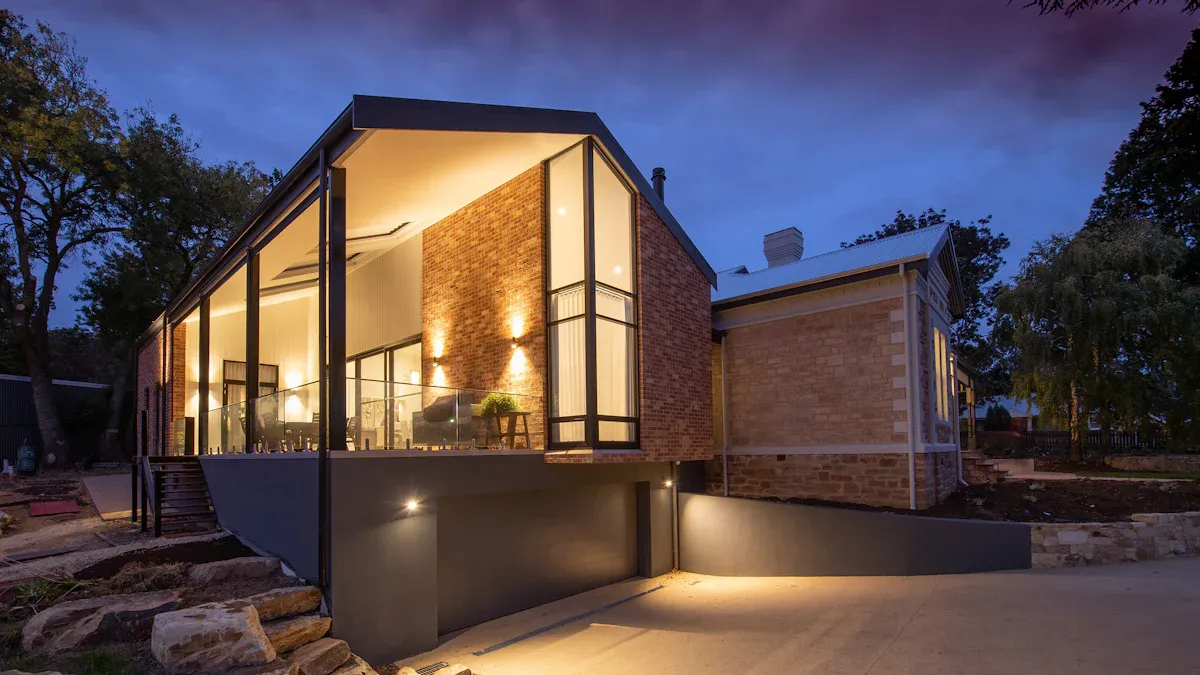LED Area Lighting solutions for commercial and residential spaces in 2025

If you’re looking for the best LED area lighting for your home or business in 2025, check out top products from companies like Signify, Acuity Brands, and Zumtobel Group. About us, we’ve put together this simple guide to help you choose the right led light:
Category | Leaders & Trends |
|---|---|
Commercial | Smart high-bay LED fixtures, connected lighting, IoT, and energy-saving design |
Residential | Human-centric LED area lighting, tunable white, and stylish, minimalist fixtures |
Modern LED area lighting products use less energy, last longer, and come with smart controls. These led lights help you save money, enjoy better colors, and support a greener planet. Whether you need LED area lighting for your home, office, or outdoor spaces, our product selection has you covered.
Key Takeaways
LED area lighting uses up to 70% less energy. It lasts much longer than old lights. This saves money and helps the environment.
Smart controls let you change lights with your phone or voice. This makes things easier and saves even more energy.
Pick lighting that matches your space and needs. Use bright, strong lights for businesses. Use cozy, nice lights for homes.
Outdoor LED lights can handle bad weather. They make your property safer and look better.
Plan your lighting with care and follow safety rules. Choose smart and flexible systems. This keeps your space bright and ready for the future.
LED Area Lighting Trends
Energy Efficiency
You want to save money and help the Earth. Energy-efficient lighting helps with both. In 2025, led area lighting uses up to 70% less energy than old metal halide or high-pressure sodium lamps. Here is a simple table to compare:
Lighting Type | Energy Savings Compared to Traditional | Additional Benefits |
|---|---|---|
LED Lighting | Up to 70% | Lasts long, needs less fixing, saves money |
Metal Halide / HPS | Baseline (traditional) | Uses more energy, does not last as long |
LED lighting turns most electricity into light, not heat. You get more light and use less power. This means your bills go down and there is less pollution.
Longevity and Maintenance
No one likes changing bulbs all the time. Modern led fixtures can last from 50,000 to 100,000 hours. That is about 20 years if you use them for 12 hours each day. You will not need to fix or replace them often. Just clean the lenses and look for damage sometimes. Smart led systems can tell you if something is wrong, so you do not have to guess.
Smart Controls
Smart lighting is very common now. You can use your phone or voice to control the lights. You can also set them to turn on or off by themselves. Dusk-to-dawn sensors and motion detectors help save energy. They only turn on when needed. Some led systems can learn what you like and change the lights for you.
Design and Aesthetics
Lighting is not just for seeing at night. In 2025, many fixtures look simple and modern. Some have smooth shapes and are made from materials that can be recycled. This helps the planet. You can choose colors, brightness, and patterns to fit your mood or style. Human-centric lighting lets you change the color temperature. You can feel more awake in the day or calm at night. High color rendering makes things look real and bright. This is good for homes and businesses.
Commercial LED Lighting Solutions

Offices and Warehouses
You want your office or warehouse to be bright and safe. Good commercial lighting helps people work better. In 2025, there are many new fixtures that save energy and help people do their jobs. Here are some top picks for these places:
LED High Bay Lights: These are best for warehouses with high ceilings. They give strong light so workers can see well.
LED Tube Lights: These replace old fluorescent tubes. They fit in small spaces and are easy to put in.
LED Downlights: Offices use these for a neat look and good lighting. They help stop eye strain and help people focus.
LED Linear Lights: These are good for long aisles and big office spaces. They spread light evenly and help stop shadows.
These lights do more than just shine bright. They use up to 75% less energy than old bulbs. They last much longer—sometimes up to 200,000 hours. This means you do not have to fix or change them often. Even lighting helps workers avoid mistakes and stay safe. Flicker-free light keeps eyes comfortable during long work hours.
Tip: Pick fixtures with high color rendering. This makes colors look real and helps everyone see details better.
Outdoor Commercial Lighting
Outdoor areas need strong and steady lighting. You want parking lots, walkways, and entrances to be safe at night. New commercial lighting uses tough fixtures that last a long time. Here are some good choices:
LED Street Lights: These light up roads and parking lots. They make your property safer and easier to see.
Wall Packs: You put these on building walls. They light up walkways and doors.
Canopy Lights: These work under roofs, like at gas stations or drive-thrus.
Flood Lights and Bollard Lights: Use these to light up paths, cut shadows, and keep out intruders.
These fixtures can handle rain, wind, and bumps. They help stop accidents and make your business look friendly. Bright outdoor lights also help security cameras and make people feel safe.
Energy and Cost Savings
Switching to led area lighting saves money every month. You use up to 70% less electricity than old lights. Many utility companies give rebates when you upgrade, so you save even more. Long-lasting fixtures mean you do not have to change bulbs as much, which saves on maintenance.
Let’s see how some brands compare in 2025:
Brand | Price Range | Brightness & Light Quality | Durability & Protection | Best For |
|---|---|---|---|---|
Philips Lighting | High | High brightness, long lifespan | High protection | Offices, retail, industrial |
GE Lighting | High | Stable, long-lasting light output | High protection | Enterprises, commercial |
Cree Lighting | High | Excellent output, energy efficient | High protection | Complex commercial spaces |
Acuity Brands | High | Efficient, powerful lighting | High protection | Offices, industrial |
XHLUX Lighting | Medium-low | Intelligent, high brightness | High protection | All commercial environments |
Hubbell Lighting | Mid-high | High stability | High protection | High-intensity environments |
OSRAM | High | High efficiency | High protection | All commercial environments |
Schneider Electric | High | Energy-efficient, smart lighting | High protection | Smart buildings |
Lutron Electronics | High | Smart, efficient lighting | High protection | Offices, retail, hospitality |
RAB Lighting | Mid | High efficiency | Good protection | Budget-friendly businesses |
Today’s commercial lighting focuses on saving energy, smart controls, and being tough. Many businesses see big drops in energy bills and maintenance costs after switching. Some companies have saved over 60% on energy and cut thousands of dollars from maintenance each year.
Smart System Integration
Smart system integration changes how you control lighting in your building. You can connect led systems to building management using wireless tech like Bluetooth, Wi-Fi, or Zigbee. This lets you control lights from your phone, computer, or by voice.
Sensors are important. Occupancy sensors turn lights on only when someone is there. Daylight sensors dim lights when there is enough sunlight. Timers make sure lights are off when not needed. These features help you save 20% to 50% more energy.
Smart lighting systems also make your building more comfortable. You can change brightness and color for the time of day or task. Some systems use artificial intelligence to learn your habits and set the best lighting. Central controls make it easy to check all your lights and find problems early.
Note: Smart integration helps the planet by cutting energy waste and lowering your carbon footprint. It also helps you follow new building rules and standards.
Residential LED Area Lighting

Residential Lighting Products
You have so many choices for residential lighting in 2025. The best-selling products include LED strip lights and LED linear lights. People love these because they save energy, last a long time, and look great in any room. LED strip lights fit almost anywhere. You can put them under cabinets, along stairs, or behind your TV. They bend around corners and come in different colors and lengths. You can even cut them to fit your space.
LED linear lights work well for bigger areas. They give even light, so you do not see dark spots or harsh shadows. You can pick the brightness and color temperature that feels right for your home. Many of these lights have smart controls. You can dim them, change the color, or set timers with your phone or voice. Some even connect to your smart home system.
Here are some popular features you will find in top residential LED area lighting products:
Customizable length and color
Flexible installation for curved or tight spaces
High weatherproof ratings for outdoor use
Dimming and smart control options
Glare reduction for comfortable light
Eco-friendly low-voltage systems
You can choose from solar-powered or wired options. Both give you bright, reliable light and help you save on energy bills.
Outdoor Residential Lighting
Outdoor lighting does more than just light up your yard. It keeps your home safe and makes it look beautiful at night. You can use different types of fixtures to get the effect you want. Here is a quick look at how each type helps:
Lighting Type | Security Contribution | Curb Appeal Contribution |
|---|---|---|
Turn on with movement, scare off intruders, and help you see at night | Highlight entryways and dark spots, easy to control with smart features | |
Pathway Lighting | Light up walkways to stop trips and falls | Add style and guide guests, use energy-saving low-voltage or solar lights |
Accent Lighting | Show off your home’s best features, increase visibility | Create beautiful focal points and a warm welcome with dimmable and smart LED options |
Flood Lights | Brighten large areas, remove hiding spots for intruders | Focus light where you want it without bothering neighbors |
Solar-Powered Lighting | Safe, green, and easy to care for, adds safety | Soft glow and flexible placement, boosts energy savings and looks |
Smart Outdoor Lighting | Remote control, schedules, and motion sensors for better security | Modern convenience and energy savings, makes your home look great |
GFCI Outlets | Safe setup for all your outdoor lighting | Reliable and meets safety codes |
You can use spotlights to show off trees or your house. Floodlights cover big spaces like driveways. Step lights and pathway lights help people walk safely. String lights add a fun touch to patios or decks. Motion sensors turn lights on only when needed, saving energy and keeping your home secure.
Modern outdoor fixtures use strong, weatherproof materials. Many have high IP ratings, so rain or snow will not hurt them. You can pick from solar or wired options, both built to last and save energy.
Design Flexibility
You want lighting that fits your style and your space. Modern residential fixtures give you lots of design choices. LED strip lights, rope lights, and neon flex lights bend and curve to fit almost anywhere. You can stick them on walls, ceilings, or even furniture. Cut them to the size you need. Pick from many colors and brightness levels.
Smart controls let you set the mood. You can create scenes for movie night, dinner, or parties. Some lights change color with the time of day. You can highlight artwork, make your kitchen brighter, or add a soft glow to your bedroom. Outdoor fixtures work just as well. Use them to light up your garden, deck, or walkway. Weatherproof designs mean you do not have to worry about rain or snow.
You can match your lighting to your home’s architecture. Try downward-facing deck post cap lights for a cozy look. Use accent lights to show off plants or water features. With so many options, you can make your home feel just right.
Smart Home Features
Smart home features make your lighting easy to use and fun to control. Many LED systems connect to your phone, tablet, or voice assistant. You can turn lights on or off from anywhere. Set schedules so lights come on when you get home or turn off when you go to bed.
Dimmers help you save energy and set the perfect mood. Motion sensors add safety by lighting up dark areas when someone walks by. Timers and automation keep your home bright and safe, even when you are away.
Human-centric lighting is a big trend. You can change the color temperature to match your needs. Use cool white light to wake up in the morning. Switch to warm light at night to relax. Smart controls let you adjust everything with a tap or a voice command.
Tip: Choose fixtures with high color rendering. Your rooms will look more natural, and colors will pop.
Modern residential lighting solutions help you save energy, boost safety, and create the perfect look for your home. With so many choices, you can find the right fit for every space, inside and out.
Comparing Commercial and Residential Needs
Unique Requirements
When you compare lighting for homes and businesses, you see they need different things. Commercial lighting is for big places with lots of people. It must be bright and safe. It helps workers do their jobs well. These lights stay on for many hours. They need to be strong and last a long time. Residential lighting is for comfort and style. You want your home to feel nice and look good. Home lights can be softer and change for each room.
Here’s a simple table that shows how they are different:
Aspect | Commercial Lighting | Residential Lighting |
|---|---|---|
Purpose | Function, safety, and helping people work | Comfort, style, and making rooms feel nice |
Design Priorities | Tough, saves energy, follows rules | Looks good, feels cozy, fits your taste |
Light Intensity | Very bright for safety and seeing clearly | Softer light that you can change for each room |
Energy Consumption | Uses more power, must follow strict rules | Uses less power, focuses on saving energy |
Fixture Types | Strong lights like troffers and track lights | Pretty lights like chandeliers and pendant lights |
Scalability & Flexibility | Made for big or many spaces, easy to add more | Easy to change, fits your style and room size |
Cost Considerations | Costs more at first but saves money later | Cheaper, balances price and looks |
Commercial places need strong lights and tough fixtures. Homes need lights that fit your style and are easy to change. Both want to save energy, but businesses have more rules to follow.
Choosing the Right Lighting
To pick the best lighting, first think about what you need. Do you want your business to be bright and safe? Or do you want your home to feel warm and cozy? Here are some easy steps to help you choose:
1. Decide what you want the lights to do. Is it for safety, work, or relaxing? 2. Figure out how much light you need. Check lumens for brightness and watts for power use. 3. Pick a color temperature. Cool white is good for work or outside. Warm colors are nice for homes. 4. Choose LED lighting to save energy and make bulbs last longer. 5. Make sure outdoor lights can handle rain and sun. 6. Follow local rules to keep everyone safe. 7. Use different lights together—like main lights, reading lights, and accent lights—for the best look. 8. Try smart lighting for easy control and more savings.
Every space is different. A big warehouse needs different lights than a small yard. For example, the Empire State Building used LED lights and saved 40% on energy. That saved them a lot of money. You can save money and make your space look great with the right lights and design.
Tip: Always pick lighting that fits your space and how you use it. One kind of light does not work for every place!
Lighting Implementation Tips
Installation and Maintenance
Setting up your lighting the right way is important. You want your led fixtures to work well and last long. Here are some easy tips you should follow:
Make a plan for your project. Measure your space and pick where you need the most light.
Put up fixtures so they are tight and steady. This stops shaking that can break inside parts.
Use good seals and gaskets. These keep out dust and water, which is extra important outside.
Check all the wires. Make sure they are tight and follow the maker’s directions.
Put fixtures at the best angle and height. This gives you better light and helps with heat.
Clean your fixtures often. Dust and dirt can block light and make them too hot.
Look for damage. Change any broken parts right away.
Tip: If you have places that are hard to reach or old wires, think about hiring a pro. They can do tough jobs and make sure your lighting is safe.
Safety and Compliance
You want your lighting to be safe and follow the rules. Different places have different rules. Here is a quick look at what you should know:
Standard / Code | What It Means for Lighting | Where It Matters |
|---|---|---|
ADA | Good lighting for people with disabilities | Mostly commercial, some homes |
IBC | Minimum light levels and emergency lighting | Commercial and homes |
NEC | Safe wiring and installation | Everywhere |
OSHA | Safe workplaces, emergency lights | Workplaces, home offices |
Title 24 | Energy-saving rules and controls | Mostly commercial, some homes |
IES | Best lighting levels and color | Both |
Emergency Lighting Standards | Exit lights, backup power | Commercial, big homes |
Advanced Lighting Controls | Sensors and timers for safety and savings | Both |
Lighting Power Density (LPD) | Limits on power use | Both |
Note: Always check your local rules before you start. Following these rules keeps everyone safe and helps you avoid trouble.
Future-Proofing
You want your lighting to last and work with new tech. Here are some ways to keep your system ready for the future:
Pick modular lighting. You can change parts or upgrade without buying all new lights.
Choose smart systems. IoT and wireless controls let you use your phone and add new things later.
Get fixtures that work with many controls and sensors. This makes it easy to add automation or energy checks.
Think about being green. Modular and smart lighting uses less energy and makes less waste.
Watch for new ideas. Human-centric lighting, solar-powered lights, and AI controls are getting more popular.
Smart lighting systems can work with your security, heating, and even air monitors. This makes your space safer, more comfy, and ready for what comes next.
You have many great choices for LED area lighting in 2025. Look for options that save energy, last a long time, and offer smart controls like app or voice features. Pick the right brightness and color for each room. Choose fixtures made from eco-friendly materials.
Tip: Always check if your lighting matches your needs and supports future upgrades. Smart, efficient lighting will keep your space bright and comfortable for years.
FAQ
What makes LED area lighting better than traditional lighting?
LED area lighting uses less energy and lasts much longer. You save money on your power bill. You also spend less time changing bulbs. LEDs give you brighter, more natural light.
Can I control LED lights with my phone or voice?
Yes! Many LED lights work with apps or smart speakers. You can turn them on, off, or dim them with your phone or by talking. It makes life easier and more fun.
Are LED lights safe to use outdoors?
Absolutely. Outdoor LED lights have weatherproof designs. They handle rain, snow, and heat. Just check the IP rating before you buy. Look for IP65 or higher for the best protection.
How do I pick the right brightness for my space?
Check the lumens on the package. More lumens mean brighter light. For a living room, try 1,500–3,000 lumens. For a garage or warehouse, you might need 5,000 lumens or more.
Do LED lights help the environment?
Yes! LEDs use less electricity and last longer. You throw away fewer bulbs. Many LED fixtures use recyclable materials. Choosing LEDs helps you lower your carbon footprint and protect the planet.
See Also
Key Uses And Advantages Of LED Area Lighting Systems
Outdoor Commercial Lighting For Safety Efficiency And Style
Energy Efficient LED Indoor Lights: Types And Uses Today
Creative Commercial Lighting Balancing Design Efficiency And Use
Effective Commercial Lighting Strategies And Applications For Businesses

